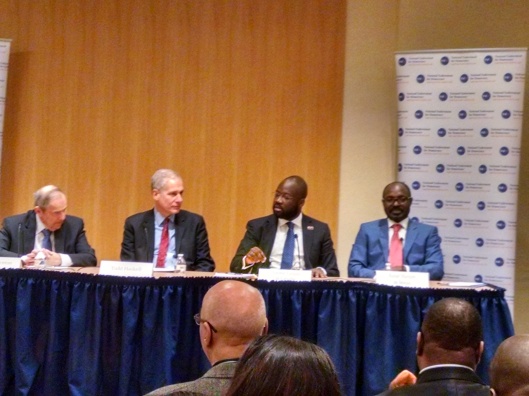
From right to left – Marques, Luvualu, and Haskell
I’m recently back from nearly two years in Liberia. I just attended an event at NED that was so good, I had to bring Africa in DC briefly out of retirement.
Thanks to the tireless efforts of Pierre Tantchou, NED’s Program Officer for Angola, DC area Africanists were able to hear the noted Angola human rights advocate Rafael Marques de Morais debate differing “Perspectives on Transparency, Human Rights, and Civil Society in Angola” with the Angolan government’s Ambassador-at-Large, Antonio Luvualu de Carvalho.
You can watch the whole exchange here and I encourage you to do so.
Marques opened his remarks by painting a picture of a petrostate that like Venezuela is feeling a crunch from the rapid collapse in the price of oil. He noted that “poverty is on the rise…food shortages are becoming severe.”
At one point he gave Luvualu a pat on the back as he criticized claims Luvualu had made that young dissidents were in league with NATO.
He concluded by noting the paucity of foreign attention on Angola and urged the US to encourage dialogue between the Angolan government and civil society. Luvualu expressed no disagreement and warmly clapped following Marques’ remarks.
Luvualu seemed to pivot from prepared remarks and addressed several of Marques’ points head on. General murmurs from the crowd and the feeling in the room indicated that he was holding his own. In response to Marques’ cries of nepotism in light of the vast wealth of the President’s children, especially his daughter, Isabel dos Santos, Luvualu asked to not insignificant laughter, if the President’s children should just study and sit at home and pointed to the Bush family political dynasty in the US.
Luvualu did get in a few digs at Marques. He called Marques a ‘big liar’ and accused him of taking several issues personally rather than professionally.
Todd Haskell, Deputy Assistance Secretary for Africa at the State Department rounded out the panel. He gave typically diplomatic remarks, but overall, they seemed to favor the Angolan regime. I don’t have enough context, but I found it interesting that Angola was praised for its “able leadership in the Great Lakes and Gulf of Guinea” and for “the willingness of the Angolan government to send a representative to this forum.”
By the end of the session for delivered remarks, Luvualu seemed to have done the MPLA proud. It was only during Q&A when a NED staff pointed out that one of Luvulu’s core examples (of nepotism in France under Sarkozy) that the tide turned in Marques’ favor.
The historical question – the US backed the armed opposition to the MPLA and did not recognize Angola until the early 1990s – was largely untouched, but Luvualu did employ this language at one point, noting that “for the past 30 years” the government has suffered from a misinformation campaign with biased individuals spreading propaganda overseas.
The exchange, which became progressively more vigorous, ended with both parties apparently agreeing to hold a similar public forum in Luanda.
Strong kudos to NED for bringing together two antagonists. Luvualu probably has no policy clout, but I suspect these sort of convocation are a necessary part of the process for opening up political space in Angola (albeit agonizingly slowly). It was only unfortunate that Haskell did not take the opportunity to be more transparent about US perceptions of Angolan governance.
